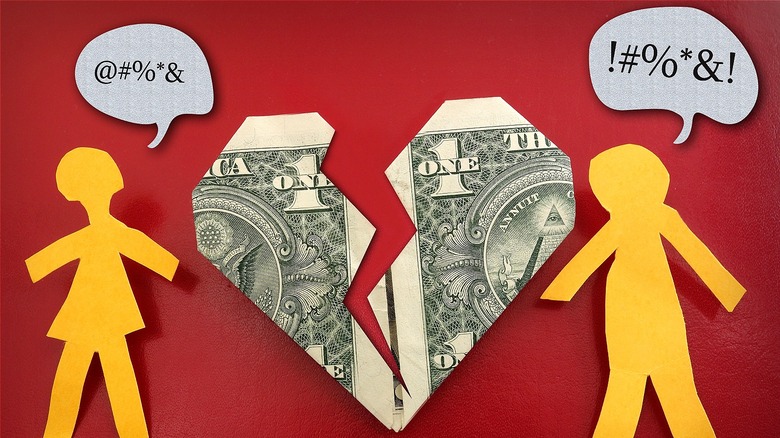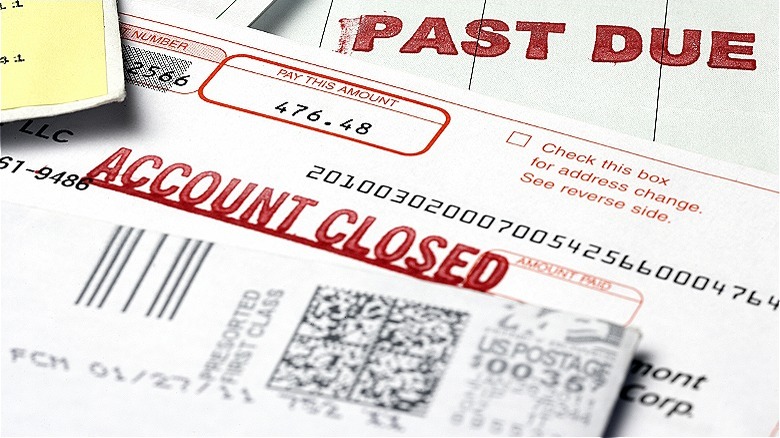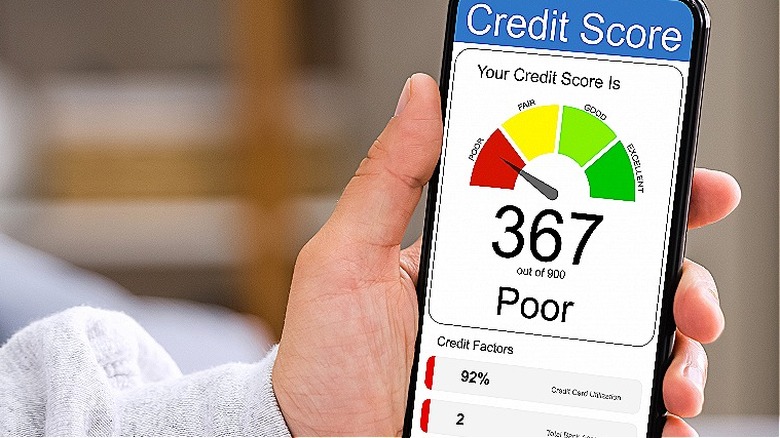13 Major Money Red Flags To Look Out For In A Partner
It can be difficult to be in a relationship with a partner whose outlook on money and finances differs greatly from your own. Financial matters can be a significant cause of stress for couples, both while dating and on into marriage. In fact, according to a survey by SunTrust Bank, 54% of those surveyed said partner debt was reason enough to seek a divorce (via CNBC). So, the earlier you can recognize major money red flags, like a partner's spending habits, bill-paying behavior, or love of gambling, the better. That way, you can weigh early on whether your and your partner's differences when it comes to money are too great for the two of you to be compatible.
If you're in a relationship with someone whose attitude toward money management is totally out of alignment with yours, it's certainly better to find that out before opening a joint bank account, signing a lease, taking out a loan, or otherwise entering into any agreements that will link you to one another financially. In short, ignoring such money red flags in a partner today can lead to a future filled with financial strife.
1. Lying about money
When the person you're in a relationship with is less than truthful with you about money, that's certainly a major red flag. Maybe they're dishonest about everything in general, or maybe their lack of truthfulness is just related to money. In either case, this type of behavior is concerning in a partner.
There are various ways a person can lie about their finances. For example, they may be dishonest about their spending habits, either claiming things cost less than they paid or even hiding purchases to keep their partner from finding out what they have bought. They may also lie about how much debt they have, claiming to owe little or no money when the opposite is true.
Financial lies can also be about earnings. A person may pretend to make more money than they actually earn, a lie that may contribute to additional dishonesty about spending. Or, they may claim to earn less than they do, as a way to manipulatively guilt you into contributing more than your fair share without expecting them to pay more.
2. Being secretive about money
Being secretive about money isn't the same thing as directly lying about it, but it's still a major money red flag to watch for in a relationship. A person doesn't need to (and probably shouldn't) share all there is to say about their finances on a first date, but when a relationship progresses from casual dating to a true partnership, money is certainly an important topic for couples to openly and honestly discuss with one another.
If you're in a relationship that's starting to get serious and one partner still views the topic of money as taboo, that could well be a sign the individual has something to hide or, potentially, that they have trust issues. In either case, if you and your partner aren't able to move beyond financial secrecy to transparency on this key topic, then this red flag doesn't bode well for a successful long-term relationship.
3. Pressuring you about big financial decisions
If you're in a relationship with someone who doesn't seem willing to take no for an answer when you object to extravagant spending, that's a pretty major financial red flag. When you say no to using your money in a certain way, your partner should respect your decision. If they continue to exert pressure in their quest to convince you to invest in something, buy an expensive item, co-sign a loan, or anything else that would involve you spending money you shouldn't or don't want to spend, that's not a sign of financial compatibility.
At best, they're not respecting your boundaries. At worst, they may have a nefarious motive. This is true whether you each manage your money separately or if your finances are co-mingled. When one partner wants to make a huge purchase and the other isn't ready to take that leap, the situation deserves discussion — but not pressure. That kind of pressure can easily cross the line into bullying, which is never a constructive solution.
4. Having difficulty keeping a job
Changing jobs isn't always a bad thing. If a person gets an opportunity to advance or to move to a position that's a better fit for them, taking that job can be a great financial move. Further, leaving a truly toxic work environment can be a positive, sometimes even if the person doesn't already have another position lined up. And, anyone can find themselves in the situation of losing their job as a result of downsizing through no fault of their own.
The situations described above aren't indicators that a person has difficulty keeping a job. However, when a person continually gets fired for problems like excessive absenteeism or tardiness, failing to perform, poor workplace behavior, a bad attitude, or related matters, that's a red flag about their employability. What's more, a person doesn't have to get fired for there to be a serious issue with their ability to keep a job. For example, if a person is in the habit of quitting otherwise good jobs because they get angry at a coworker or customer, don't get their way, or have a bad day at work, that also doesn't bode well for their ability to maintain gainful employment.
5. Being irresponsible with credit cards
Having and using a credit card isn't a money red flag in and of itself. After all, nearly 80% of consumers over the age of 18 have at least one credit card (according to the Federal Reserve Bank of Atlanta), with many having multiple accounts. Responsible credit card usage can help a person establish and maintain a good credit score; however, not everyone who has a credit card uses theirs appropriately. If you're in a relationship with a person who charges things they can't afford regularly, yet pays only the minimum payment on their credit card every month, that's a recipe for financial disaster. The same is true if they're in the habit of paying late (those late fees add up) or not paying at all.
Being irresponsible with credit cards negatively impacts not just the person who is doing it, but also their spouse or long-term partner. If you stay with someone long term who is irresponsible with credit cards, their bad financial habits will also impact you. For instance, their credit card balances and payment history issues may prevent you from being able to buy a home or a vehicle together. Instead, you'll have to go without or put everything only in your name (which means that you'll have to shoulder all of the financial responsibility and risk).
6. Failing to pay their bills
Using credit cards irresponsibly isn't the only way a person can exercise poor financial judgment. If you're in a relationship with someone who regularly fails to pay their bills, it's important to recognize this behavior for the glaring money red flag that it is. Of course, anyone can occasionally forget when a bill is due and find themselves having to absorb a late fee into their budget because they missed the deadline by a few days. That alone, as an isolated incident, isn't a sure sign of financial irresponsibility. However, when a person habitually fails to pay their bills, they're exhibiting poor judgment regarding money management.
Whether they claim to have forgotten their bills were due or if they have taken on more expenses than they can afford, this behavior is alarming. If a person can't remember to pay their water or power bill, chances are they'll forget to pay all kinds of other bills and debts, too — a situation that will negatively impact their romantic partner as well as themselves.
7. Getting constant debt collection calls
If you don't live with someone, it might be pretty difficult to have a good sense of whether they pay their bills or not. After all, when you don't live in the same house with your partner, you probably won't see the mail before they go through it (if at all). They could get piles and piles of past-due notices and you'd never know. Fortunately, when your goal is to catch financial red flags before you get too deeply involved, debt collection notices don't stop at the mailbox.
When bills go unpaid long enough, debt collectors will start to reach out by phone. If you're dating someone who has significantly past due bills, chances are they'll get a lot of debt collection calls. They may not tell you who's on the other end of the call, but you can get a good sense of what's being discussed by reading between the lines of what your partner says when they answer the phone. If they never answer their phone when you're around, that could also be a sign they're dodging debt collectors.
8. Having bad credit (and not trying to fix it)
Should bad credit automatically disqualify someone as a prospective relationship partner? Probably not, at least not as an absolute disqualifier. A lot of things can cause a person to have a less-than-stellar credit score, from not yet establishing a credit history to having to over-rely on credit cards to cover living expenses due to an illness or to losing a job through no fault of their own. Those aren't good reasons to rule out someone you like as a relationship partner; but, they're also not the only reasons a person might have bad credit. A person could have a low credit score because they're financially irresponsible or have other problems that can prove relationship deal-breakers.
The key to knowing whether or not to treat bad credit as a relationship red flag lies with the reason the person has a poor credit history and — maybe even more important — what they're doing to improve their score. If they don't care if their credit stays bad forever, that's a red flag. However, if they're actively working to build a solid credit history, you just may discover that the two of you are financially compatible even if your credit scores are pretty far apart right now.
9. Having a gambling problem
According to a 2023 study conducted by Bread Financial, the number-one relationship deal-breaker for singles was a gambling problem. It's one thing for someone to enjoy gambling with money they can afford to lose as a form of entertainment, as long as they're able to do so without crossing the line into excessive or compulsive gambling. Dating someone who occasionally enjoys date night at a casino isn't necessarily a money red flag, but there's a big difference between this type of activity (for a person who can afford it) and problem gambling, which is a massive red flag in a relationship partner.
Further, a person can have a serious gambling problem without ever setting foot in a casino. A lot of gambling today takes place online, from poker to sports betting to slots. No matter where gambling takes place, though, real money is involved. When a person is compelled to gamble, whether in person or online, with money that they can't afford to lose, that's a sure sign of a gambling addiction. Problem gambling will take a toll not only on the one who gambles but also on anyone who is in a relationship with them.
10. Making big impulse purchases
Being in the habit of impulsively purchasing high-ticket items can be just as much of a financial red flag in a partner as excessive gambling. In both cases, the individual is divesting themselves of money that they may not be able to afford to spend in such a lavish way. Impulse buying involves making big monetary decisions without thinking through the long-term impact of one's actions. Such behavior might make for a fun time when you're casually dating someone, but you might not find this behavior to be appealing in a life partner.
Sure, it may be more than a bit thrilling (at first) to date someone who buys you extravagant gifts on a whim, but it's important to stop and think about what that behavior might mean for the long term if you stay together. A person who's in the habit of spending big bucks on impulse without consulting anyone else might have a tough time breaking this habit once they're in a serious relationship.
11. Living beyond their means
Impulse purchasing isn't the only form of extravagant spending that represents a major relationship red flag. Spending doesn't have to be impulsive to be ill-advised. When a person's lifestyle reflects spending habits that their earning situation doesn't support, that's a sure sign that they're living beyond their means. Whether they're trying to keep up with a partner or friends who make more money than them or if they think it's impressive to flaunt money they don't have, such behavior is not a desirable trait in a life partner.
When you first start spending time with someone, chances are you don't have a clear picture of how much money they make. Overspending may not seem obvious at first, but as time goes by you'll be better able to recognize if their spending habits and lifestyle are consistent with what they earn. Pricey vacations, designer clothes, and expensive dinners can be lovely for those who can truly afford them, but not at the cost of financial stability. Being seriously involved with someone who is in the habit of living beyond their means is an expensive path to finding yourself deeply in debt, sooner rather than later.
12. Using money to manipulate or control you
It's hard to completely separate love and money, especially in a long-term relationship. That's why financial compatibility is so important for couples. However, if you find yourself in a relationship with someone who uses money as a way to try to control you, that's a major red flag that should never be ignored. There are a lot of ways a person can use money as a means of control, and they're all warning signs that are important to heed.
From trying to make you feel bad because you earn more or less money than they do to holding gifts they gave you over your head, the goal of this person is to manipulate you. Some master manipulators will even seize control of the budget and make you feel like you need permission to purchase small items that you truly need (like groceries or toiletries) while they buy anything and everything that they want. That's tyranny, not a partnership.
13. Not paying their fair share
Relationships should be partnerships in which everyone contributes fairly. If you find yourself in a relationship with someone who habitually finds a way to get out of paying their fair share, that's a pretty big money red flag. It's not that everything has to be split 50/50 — after all, a relationship isn't a financial transaction and not everyone has the same financial means. However, if every time you go out to dinner, your partner conveniently disappears just before the check appears and stays gone an uncharacteristically long time like they're waiting for you to pay, that's a pretty good sign they're ducking out on the tab.
This isn't the only way that failing to pay one's fair share can manifest. Pay attention to what they order when they know someone else is paying versus what they get when they may need to pick up the bill. If they go directly to the most expensive thing on the menu when they're not paying, but never order such pricy items when they are, their behavior is sending a message. The same is true with tipping habits in restaurants. If they leave really small tips or no tip at all when they do pay, that doesn't speak highly of their sense of contributing fairly.













